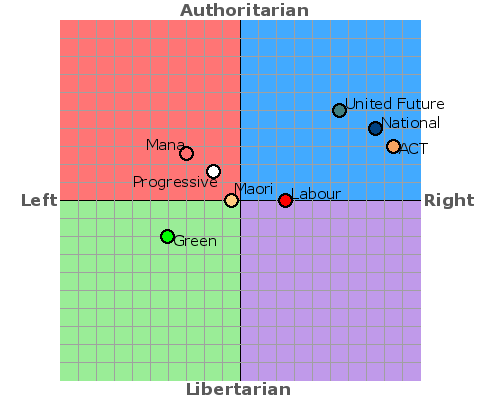Political Compass placed NZ political parties on a two-dimensional left/right, authoritarian/libertarian chart. (HT: Bryce Edwards)
- The left-right economic axis seems about right. It's odd that Labour this year, running on a $15 minimum wage, capital gains tax, and a fairly dirigiste programme, ranked right of centre, but the relative positions seem roughly correct.
- The authoritarian-libertarian axis does not seem right. ACT, which mused about marijuana legalization, is ranked more authoritarian than Labour, which would have imposed pretty severe alcohol regulations. ACT is also ranked as more authoritarian than Maori, who seek to ban the sale of tobacco. Many of ACT's candidates were explicitly libertarian. Putting them as more authoritarian than Labour requires putting a fair bit of weight on their crime & punishment stance and mapping views on indigenous rights / individual rights onto a libertarian / authoritarian axis. The party positioning for ACT might be right for the post-election result, with John Banks as the only ACT MP. But not pre-election. Brash was the most libertarian candidate we've had in ages; it's a shame he didn't win in '05 (conditional on his having had an equivalent to Heather Simpson keeping the details in order).
- They're right that the Greens aren't tons more socially liberal than Labour. Yes, they take a relatively libertarian position on gay marriage / adoption, copyright, freedom of speech, and marijuana policy. But they also take a relatively authoritarian position on "nanny state" issues. I don't think the Greens, Maori, and ACT aren't as far apart on social liberalism as here made out; those three parties were regularly the ones who voted liberal on social issues in the last couple of Parliaments.
- They correctly place no major party in the right/libertarian quadrant. Even ACT ought only have made it onto the zero line for 2011. This remains a bit puzzling as NZES data shows there are at least as many voters would count as social liberal / fiscal conservative as there are true conservatives. The classical liberals who have supported ACT will have to think hard about whether ACT remains the best vehicle; they know John Banks better than I do.
- I wonder where the dot for NZ First would have landed. North-centre?
- I wish they would release density maps of survey respondents by country. Sure, it's a self-selected sample. But I'd still be curious how many respondents from NZ wound up in the purple quadrant.


I ended in the purple - and it put me further towards the centre and well south as a liberal in comparison with National of which I'm an active member.
ReplyDeleteAt least some of the quetions don't fit NZ very well.
I don't think the political compass is especially accurate. There are people who score higher on both liberalism and right-wingness than I do, but who on most policy issues we discuss are much more centrist.
ReplyDeleteI think all of the parties need a big punt leftward. Given Labours industrial relations policy it's a nonsense to have them right of centre. And as you say, the Greens are not as liberal as all that.
Given that that wording of the questions in this particular test has been criticised for being rigged in favour of convincing people that they're really right-libertarians, perhaps it's not surprising that all the parties are to the right (on the horizontal axis) of where I think they ought to be, although the relative positions are plausible.
ReplyDeleteI do agree that both the relative and absolute positions on the vertical dimension are way off.
For a start, given that (as Eric has noted) NZ has one of the world's more libertarian social policy environments, it doesn't really make sense that all the parties (except for Greens) are in the authoritarian half of the map.
Second, I don't see any material difference on authoritarianness between Labour and National. Nats may be tougher on crime (in some ways), but Labour had its own draconian streak (campaign finance reforms etc.)
ACT is a tricky one -- no question there is a right-conservative (Newman, Garrett, Banks) streak in the party, but the liberal side (e.g. Franks, Brash, Prebble) has been, overall, the dominant one. I don't see there being any NZ party that's less authoritarian.
The most wrong bit is that the Greens are by far the most libertarian party. Sure, they may be more liberal on certain issues (crime, marijuana, LGBT) -- but on balance, Green policy is the MOST authoritarian of any of the parties: think about their positions on resource management, international trade, smoking, food nannyism etc. One might argue that Green authoritarianism is on the economic rather than social side, but, if so, that just heightens the weakness of distinguishing between "economic" and "personal" freedom.
Eric,
ReplyDeleteWhere is NZ first, in the graph.
Why do political commenters refuse this powerful voice of the people.
Look for a coalition of Maori and NZ First coming up shortly.